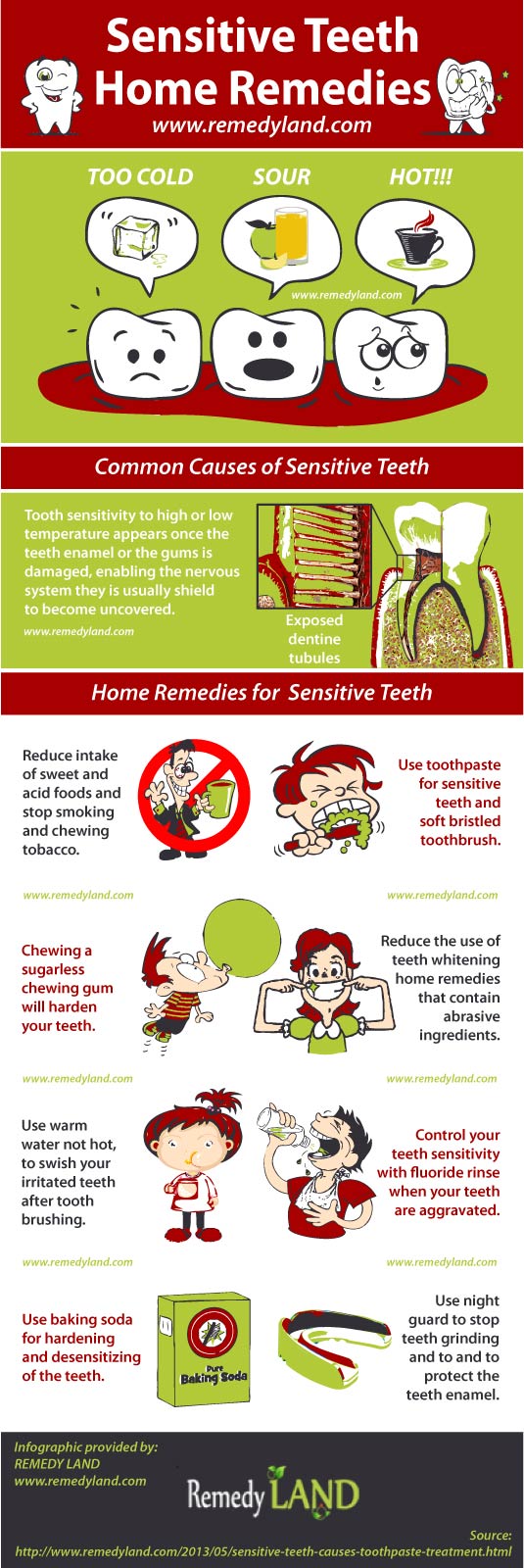Sensitive teeth
You consume a iced tea, chew on a sugary snack or perhaps slurp a bit of warm soup and you feel the shocking stinging feeling in a single or maybe more of your teeth. You’ve have sensitive teeth, a relatively gentle term for what could be a very unpleasant problem.
The medical phrase for sensitive teeth is dentin hypersensitivity. It could appear for several factors, however if the sensitivity is severe or constant, you must seek advice from your dental office. The contributing factor could be associated with nerve complications which affects the teeth or perhaps could be because of bad oral hygiene leading to receding gums or periodontal condition.
Harmful bacteria within tooth plaque and tartar could have a significant role in receding gums, therefore the usage of a antiseptic mouthwash could be beneficial. Additionally, make use of a fluoride mouthwash with a higher level of fluoride to reduce tooth plaque accumulation.
What causes sensitive teeth
Each and every tooth carries nervous system within it. Usually, all these nerves are shielded by the teeth enamel or the hard coating which covers the external surface of every tooth.
The manner in which the gums overlap every tooth additionally assists in keeping the tooth nervous system insulated from the oral cavity. Tooth sensitivity to high or low temperature appears once the teeth enamel or the gums is damaged, enabling the nervous system they is usually shield to become uncovered.
Effects of an in office desensitizing toothpaste on sensitive teeth.
Tactile sensitivity scores
Air blast sensitivity scores
Teeth sensitive to cold and hot
The tooth roots, which were not protected by tough teeth enamel, consist of a large number of small tubules, ending in the tooth’s nerve center. All these dentinal tubules permit the stimuli, for instance, the warm, chilly or sugary meals, to get to the nerve in the tooth, which ends up in the discomfort you are feeling. Lots of individuals are afflicted by sensitive teeth.
Owning sensitive teeth can be very much unpleasant, occasionally or each and every day. Pain could be occasional or regular during the day. Or it generally occurs and disappear, it is usually proportional to certain trigger, for example hot or cold meal and beverage or even tension put on the tooth. Tooth sensitivity to high temperature happens when the layers which usually shield that tooth’s interior nervous system become damaged, fractured or elsewhere fail to function correctly.
Deterioration to these shielding layers could originate from tooth decay, from teeth grinding or brushing teeth too much or from periodontal condition. The good news is, there are many treatments that can decrease tooth sensitivity to high or low temperature. Chipped or damaged tooth might be stuffed with harmful bacteria from tooth plaque and get into the pulp, leading to soreness. Brushing too rigorous is another cause. With time, brushing way too hard or choosing a rough bristled toothbrush could wear out teeth enamel and put the tooth dentin at risk.
This may also lead to recession of the gums. Grinding teeth or clenching the teeth may lead to fractures which get into the tooth’s exterior, producing a path to the nervous system. In the same way, tooth decay can cause cracks or pockets in the tooth’s exterior. Tooth sensitivity to high or low temperature may also happen if the gums are not able to overlap the tooth enamel correctly, generally because of periodontal disease. Swollen and painful periodontal tissue might cause tooth sensitivity because of the disappearance of holding ligaments, which reveals the tooth root exterior that leads straight to the nerve of the tooth.
Usually, just the exposed regions of a tooth are protected with teeth enamel and tooth root is protected with a fragile, a lot more porous material known as dentin. The gums usually work as a wall that protect tooth root from the rest of the oral cavity. When periodontal health problem leads to the gums to recede, the dentin could become revealed. Warm meals and beverages which create contact with revealed dentin could immediately irritate the nervous system beneath it. Frequent intake of foods with a very high acid content, may cause teeth enamel erosion.
Home remedies for sensitive teeth
The upside is there are steps you are able to do to control the pain and preserve your teeth. You will find products designed for individuals with sensitive teeth, toothpastes as well as other dental care solutions specifically created for sensitivity issues.
- Use toothpaste for sensitive teeth and soft bristled toothbrush.
- A lack or an excess of saliva can cause softening of the teeth, therefore you can use baking soda for hardening and desensitizing.
- Chewing a sugarless chewing gum will harden your teeth because you produce more saliva.
- Control your teeth sensitivity with fluoride rinse when your teeth are aggravated by foods with lot of sugar and acid.
- Use night guard to stop teeth grinding and to and to protect the teeth enamel.
- Reduce intake of sweet and acid foods and if you are smoking and chewing tobacco you should stop immediately.
- Reduce the use of teeth whitening home remedies that contain abrasive ingredients.
Best toothpaste for sensitive teeth
A toothpaste designed for sensitive teeth may typically include an ingredient to deaden discomfort at the tooth roots. There are many manufacturers of toothpaste on the market for sensitive teeth. With consistent use of toothpaste for sensitive teeth you should observe a reduction in tooth sensitivity. You may have to experiment with a few different manufacturers to come across the solution that actually works effectively for you. Spread a small amount of the toothpaste on the revealed tooth roots with your fingertip before you want to sleep.
You should not use a tartar control toothpaste, instead use a fluoridated toothpaste. A kit for sensitive teeth may additionally provide a gentle toothbrush or a delicate electric powered toothbrush to allow you to stay away from brushing your teeth too hard. Brushing your teeth to hard can easily harm teeth. Fluoride mouthwash, accessible without a doctor prescription at your neighborhood pharmacy or in the dental area of supermarkets, will help reduce teeth sensitivity, particularly for individuals seriously affected with tooth decay difficulties. Use it once per day. Swish it around in your oral cavity, after that spit it away.
Treatment for sensitive teeth
Throughout an evaluation the dentist are going to speak with you regarding your signs and symptoms. He is going to check out your teeth to discover what is leading to the sensitivity, also to identify the best method of dealing with it. The dentist could deal with the impacted teeth with unique treatments for sensitive teeth to help reduce the signs and symptoms.
Fluoride gel, rinses or varnishes can be utilized to sensitive teeth. These could be coated onto the tooth enamel at standard dental visits, a couple of weeks apart, to increase some defense. Sensitivity may take a little while to calm, therefore you may have to take a few treatments. If this does not help you, your dentist might put a coat around the neckline of the tooth, in which the tooth and periodontal connect, to protect uncovered dentine.
A dental therapy which regenerates affected teeth enamel could also be of assistance. In situations of average to extreme tooth sensitivity to high temperature, getting relief could be achievable just with a filling, a regenerative gum therapy or a tooth root canal. For those who attempt every thing but still experience sensitive teeth, ask your dentist for additional treatments. Dentist can apply a chemical compound straight to the tooth roots to relieve your ache or use prescription strength fluoride solutions.
You may also like:
- How to stop gingival recession or receding gums treatment, causes,…
Gingival recession or receding gums, is a disorder in which the teeth roots come to be uncovered. Receding gums are common with patients with gingivitis.
- Dental erosion or tooth erosion facts, tips and treatment
Dental erosion is a long term acid damage of all or section of a tooth. Tooth erosion treatment and remedy is based on the level of tooth wear.
- Dental attrition or tooth attrition causes: bruxism or grinding the…
Dental attrition or tooth attrition facts and bruxism home remedies for teeth grinding and other parafunction habits like teeth clenching.




